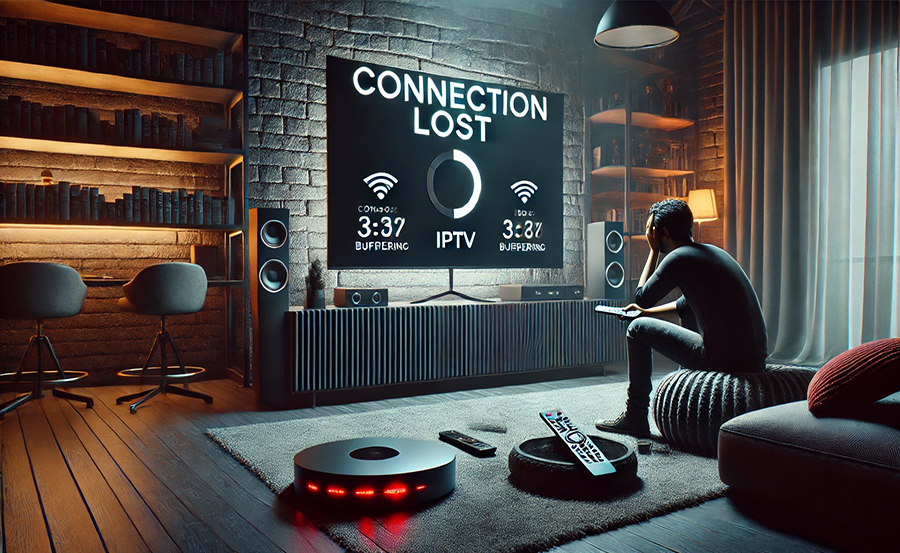Internet Protocol Television, commonly known as IPTV, has revolutionized the way we consume video content. While traditional cable and satellite services rely on broadcasting signals, IPTV uses the internet to deliver TV channels and on-demand content directly to your devices. As a result, it provides a more flexible, customizable viewing experience. But what happens when you encounter IPTV connection issues? Let’s explore how you can troubleshoot these problems, ensuring uninterrupted access to your favorite shows and channels.
Buy 1 Year IPTV Subscription and Enjoy Unlimited Content
What Is IPTV?
IPTV stands for Internet Protocol Television. This modern TV technology utilizes the power of the internet rather than conventional satellite or cable formats to transmit TV programs and video content. Essentially, it frees you from being tied down to a specific location or device, offering content when and where you want it.
But understanding IPTV might leave you wondering about connection stability. After all, internet-based services are only as good as their connectivity. Ensuring a stable and fast internet connection is crucial for enjoying high-quality IPTV streaming, especially with a top-tier service like Apollo IPTV offering the Best IPTV Subscription Service Provider in the market.
How Does IPTV Work?
The mechanism behind IPTV is both simple and complex. With IPTV, programs are stored on servers and transmitted digitally via private networks. This data can be accessed by users over the internet through a set-top box, a streaming device, or even directly on a computer or smartphone.
When considering services, ApolloIPTV‘s infrastructure is designed for seamless data transmission, reducing the likelihood of lag—a common issue with lesser-known providers. However, should technical difficulties arise, it’s essential to have a clear step-by-step troubleshooting guide: precisely what we aim to provide here.
Common IPTV Connection Issues and Their Causes
Though IPTV is a boon for content consumers, technical hitches can disrupt your viewing experience. Understanding common IPTV issues is the first step toward resolving them swiftly. Let’s take a closer look at these potential roadblocks.
Wi-Fi Connectivity Problems
Wi-Fi issues are a frequent culprit of IPTV connection troubles. These can manifest as buffering, poor video quality, or complete signal loss. Many users rely on Wi-Fi for convenience, but this can be a double-edged sword.
Possible causes include:
- Interference from other wireless devices
- Distance from the router
- Router performance limitations
Network Bandwidth Limitations
Not all internet connections are created equal. Bandwidth is the maximum rate of data transfer across a network, and having insufficient bandwidth can severely impact IPTV performance.
Some contributing factors are:
- Multiple devices using the network simultaneously
- Internet plan’s data cap
Server Downtime and Technical Glitches
No service is without its flaws, and IPTV providers might experience server outages or technical glitches from time to time. In such cases, patience is often required, but you can improve resiliency by selecting a reliable provider like Apollo IPTV.
Step-by-Step Guide to Resolving IPTV Connection Issues
The following section will explore specific solutions to fix IPTV connectivity issues, ensuring a smoother streaming experience. While these steps apply broadly, factors like equipment and internet service configuration can vary.
Step 1: Verify Your Internet Connection
The first step in troubleshooting IPTV issues involves confirming that your internet connection is stable and fast enough for streaming. Run a speed test to ensure your connection meets the minimum requirements (generally 5-10 Mbps for standard streaming, though faster is better).
If your speeds are below these thresholds, consider:
- Restarting your router
- Contacting your ISP for support
Step 2: Optimize Your Wi-Fi Setup
To improve Wi-Fi performance, experiment with your router’s placement—a central, unobstructed location is ideal. Also, limit the number of simultaneous connections on your network.
Consider upgrading to a dual-band router that can offer a more stable connection by switching between the 2.4 GHz and 5 GHz bands.
Using a Wired Connection
For a significant improvement, connect your streaming device to the internet via an Ethernet cable. A wired connection is often more stable and faster than Wi-Fi, reducing buffering and improving video quality.
Step 3: Check for Software Updates
Outdated software can also be a source of trouble with IPTV streaming. Check that your IPTV app, set-top box, or streaming device is running the latest software version. Updates often include bug fixes and performance improvements.
Most devices offer an automatic update option under settings. It is advisable to enable automatic updates if possible.
Step 4: Re-evaluate Your IPTV Provider
If issues persist, the problem may lie with your IPTV service provider. Time to consider whether your provider offers the quality and reliability you expect. Apollo IPTV stands out as a premier service known for its stable connections and extensive content library.
Key features of Apollo IPTV include:
- High-definition content
- Minimal downtime
- Responsive customer support
Preventive Measures and Tips for a Smooth IPTV Experience
Prevention is better than cure. With a few simple measures, you can ensure a seamless IPTV experience and minimize the likelihood of future disruptions.
Maintain Regular Equipment Checks
Inspect your equipment regularly to ensure everything is in working order. Cables can fray, routers can overheat, and devices can falter over time.
Set a schedule for these checks, particularly focusing on your router, as it is the centerpiece of your home network setup.
Monitor Network Traffic
Keeping tabs on network traffic can prevent one device from hogging all the bandwidth. Utilizing network monitoring tools can provide insights into which devices or applications are consuming the most data.
This can help you adjust activities accordingly, ensuring your IPTV has enough bandwidth to function optimally.
Access Point or Range Extender
If Wi-Fi coverage still proves problematic despite optimization, consider installing an access point or range extender. These devices amplify the Wi-Fi signal, potentially overcoming limitations due to distance.
A Deep Dive into Why Apollo IPTV is the Best Choice
In the ever-growing IPTV market, standing out means offering extraordinary value. Apollo IPTV excels in this regard, but what exactly sets it apart from its competitors?
Unmatched Content Library
With thousands of channels and on-demand services from around the world, Apollo IPTV provides an extensive range of content that can keep any viewer satisfied. Whether you’re into sports, movies, or documentaries, you’re covered.
Reliable Support
Having a responsive support team is crucial. With Apollo IPTV, any issue is tackled quickly by skilled professionals, ensuring minimal downtime in case of technical difficulties. It’s part of what makes them a reliable Best IPTV Subscription Service Provider.
High Performance
ApolloIPTV’s infrastructure is engineered for reliability and speed. Their consistent record of minimal buffering and high-definition streams speaks for itself, making them a top choice for those seeking uninterrupted IPTV experiences.
Affordable Pricing
Despite offering unparalleled quality, Apollo IPTV’s pricing remains competitive. It’s about offering the best bang for your buck without compromising performance or features.
Exploring the Potential of IPTV Technology
As technology continues to evolve, so does the potential of IPTV. New advancements promise even more immersive and seamless viewing experiences.
Virtual Reality and IPTV
The integration of virtual reality into IPTV services is on the horizon, potentially offering a new way to experience content. Imagine watching not just on a flat screen but being surrounded by the action.
Incorporating AI in Content Delivery
AI has the potential to revolutionize IPTV by optimizing content delivery based on viewer preferences, ensuring that users enjoy personalized experiences that adapt to their tastes and habits.
Your Questions Answered: IPTV Frequently Asked Questions

What internet speed is recommended for IPTV?
For a standard IPTV stream, a minimum of 5-10 Mbps is recommended. However, for high-definition streams, faster speeds may be needed to ensure smooth playback.
How does Apollo IPTV compare to other providers?
With its expansive channel range, reliable connections, and exceptional customer support, Apollo IPTV stands above many alternatives. It’s known for quality and consistency.
Can I use IPTV outside of my home country?
Yes, many IPTV services are accessible globally; however, it depends on the specific provider’s policy. Always check with your IPTV provider for any geographical restrictions.
What devices are compatible with IPTV services like Apollo?
Most modern devices, including smart TVs, smartphones, tablets, and computers, support IPTV services. Apollo IPTV, in particular, is designed to operate across a wide range of devices for maximum user flexibility.
Are there security concerns with IPTV?
While IPTV itself isn’t inherently insecure, always ensure your network is protected and choose a trustworthy provider like Apollo IPTV to mitigate any risks associated with streaming online.
How can I resolve buffering issues?
Buffering often relates to bandwidth issues or Wi-Fi interference. Solutions include improving your internet speed, using a wired connection, and limiting the number of devices using the network simultaneously.
Does Apollo IPTV offer a free trial?
Many IPTV providers, including Apollo, periodically offer free trials or limited-time promotions. It’s best to visit their official website or contact customer support for the most current offers.
Why IPTV Smarters is Gaining Popularity in 2023


